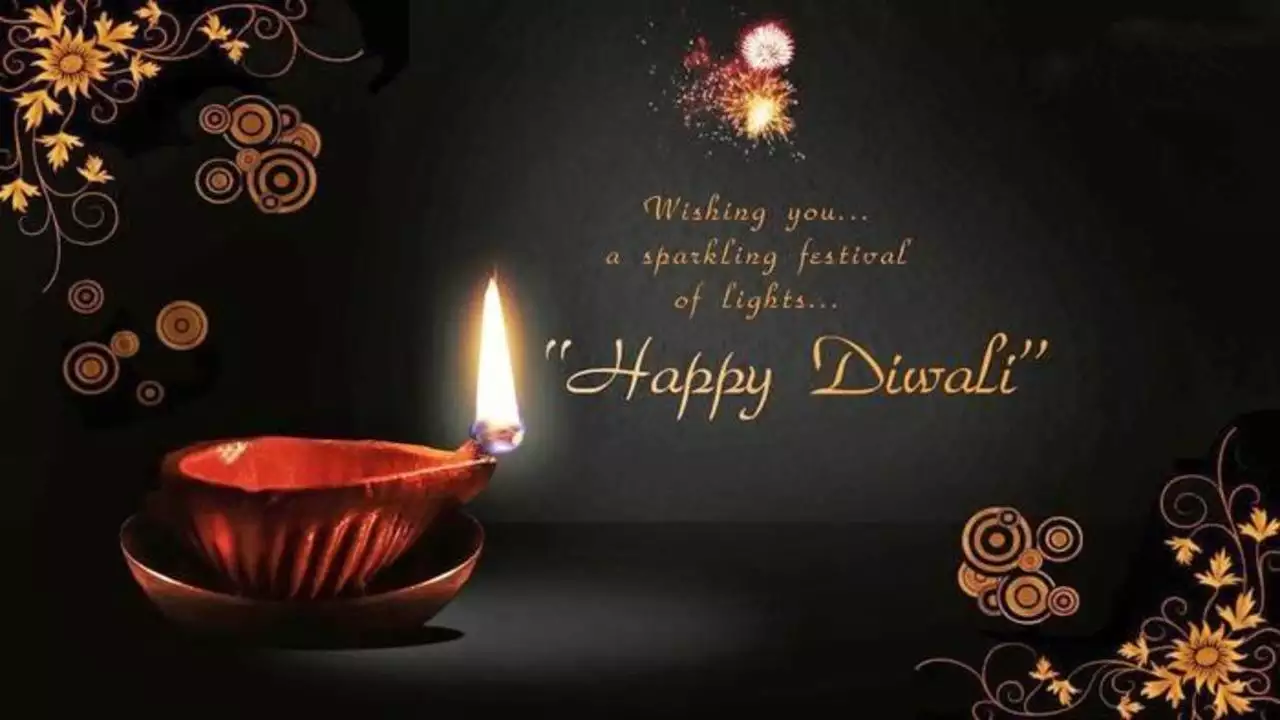Diwali, also known as Deepavali, is one of the most celebrated festivals in India and around the world. Known as the “Festival of Lights,” it symbolizes the victory of light over darkness, good over evil, and knowledge over ignorance. During Diwali, homes and streets are illuminated with the warm glow of oil lamps (diyas), candles, and colorful electric lights. People exchange gifts, enjoy festive meals, and send heartfelt wishes to friends and family. This article delves into the significance of Diwali, ways to wish your loved ones, and answers some frequently asked questions about the festival.
The Significance of Diwali
Diwali holds a profound significance in Hindu culture and is celebrated by people of various religions, including Sikhs, Jains, and Buddhists, albeit with different historical and spiritual contexts.
- Hinduism: Diwali marks the return of Lord Rama to Ayodhya after a 14-year exile and his victory over the demon king Ravana. It also commemorates the victory of Lord Krishna over the demon Narakasura. In some regions, it is associated with the worship of Lakshmi, the goddess of wealth and prosperity, and Lord Ganesha, the remover of obstacles.
- Sikhism: Diwali coincides with Bandi Chhor Divas, which celebrates the release of Guru Hargobind Ji from imprisonment.
- Jainism: For Jains, Diwali marks the attainment of nirvana by Lord Mahavira.
- Buddhism: In certain Buddhist communities, Diwali is celebrated as Ashok Vijayadashami, marking the conversion of Emperor Ashoka to Buddhism.
How to Wish Your Loved Ones a Happy Diwali
Wishing your loved ones a happy Diwali can be done in many heartfelt and creative ways. Here are some ideas to help you spread joy and light during this festive season:
- Traditional Wishes:
- “Wishing you a Diwali filled with joy, prosperity, and love. Happy Diwali!”
- “May the divine light of Diwali shine with peace, prosperity, happiness, and good health in your life. Happy Diwali!”
- “May the lamps of Diwali brighten your life and Rangoli add more hues to your life. Have a Happy Diwali!”
- Personalized Messages:
- “Dear [Name], may your Diwali be as bright and joyful as the lights that illuminate this festival. Wishing you a very Happy Diwali!”
- “To [Name], may the warmth and splendor of this auspicious occasion fill your life with happiness and cheer. Happy Diwali!”
- Corporate Greetings:
- “Wishing you and your family a prosperous and joyful Diwali. May the festival of lights bring you success and happiness. Happy Diwali!”
- “May this Diwali bring new opportunities and prosperity to your business. Happy Diwali to you and your team!”
- Diwali Quotes:
- “Light over darkness, hope over despair, and the victory of good in the world. May these blessings be yours this Diwali.”
- “Diwali is the time to celebrate with your loved ones. Cherish the moment, and spread the light of joy and happiness.”
- Diwali Poems:
- “With gleam of Diyas, and the echo of chants, may happiness and contentment fill your life. Wishing you a very happy and prosperous Diwali!”
Creative Ways to Send Diwali Wishes
- Handwritten Cards: Despite the digital age, a handwritten card adds a personal touch that is cherished by many. Use colorful pens and include traditional motifs such as diyas, rangoli designs, and floral patterns.
- Digital E-cards: For those who are tech-savvy, digital e-cards can be a quick and beautiful way to send your wishes. Numerous websites and apps offer customizable Diwali e-cards.
- Social Media Posts: Use platforms like Facebook, Instagram, and Twitter to share your Diwali greetings. Create a festive post with images and videos to convey your wishes.
- Text Messages and WhatsApp: Send a quick and heartfelt message via SMS or WhatsApp. You can also share Diwali-themed stickers and GIFs.
- Phone Calls and Video Chats: Sometimes, a personal touch is necessary. A phone call or video chat can make your loved ones feel special and appreciated.
- Gifts and Hampers: Accompany your wishes with thoughtful gifts or hampers filled with sweets, dry fruits, and other festive goodies.
Frequently Asked Questions (FAQ) About Diwali
What is Diwali, and why is it celebrated?
Diwali, also known as the Festival of Lights, is a major Hindu festival celebrated to mark the victory of light over darkness and good over evil. It commemorates various historical events, including the return of Lord Rama to Ayodhya after defeating Ravana, the slaying of Narakasura by Lord Krishna, and the worship of goddess Lakshmi.
When is Diwali celebrated?
Diwali is celebrated on the 15th day of Kartika, the holiest month in the Hindu lunar calendar. The exact date varies each year based on the lunar calendar, but it usually falls between October and November.
How long does Diwali last?
Diwali celebrations typically last for five days. Each day has its own significance:
- Day 1 (Dhanteras): The beginning of the festival, dedicated to wealth and prosperity.
- Day 2 (Naraka Chaturdashi/Choti Diwali): A day to abolish laziness and evil.
- Day 3 (Lakshmi Puja): The main Diwali day, celebrated with lights, fireworks, and Lakshmi worship.
- Day 4 (Govardhan Puja/Annakut): A celebration of Lord Krishna’s victory.
- Day 5 (Bhai Dooj): A day to celebrate the bond between brothers and sisters.
What are some common Diwali traditions?
Common Diwali traditions include:
- Lighting Diyas and Candles: To symbolize the victory of light over darkness.
- Rangoli: Creating colorful patterns on the floor using colored powders, rice, or flower petals.
- Fireworks: Bursting firecrackers to celebrate the festival.
- Exchanging Gifts: Sharing sweets, dry fruits, and other gifts with friends and family.
- Feasting: Enjoying festive meals with special sweets and savory dishes.
How do different regions in India celebrate Diwali?
Different regions have unique customs and traditions:
- North India: Diwali marks the return of Lord Rama to Ayodhya. Homes are decorated with lights and rangoli.
- South India: Celebrates the victory of Lord Krishna over Narakasura. Oil baths and early morning prayers are common.
- West India: Particularly in Gujarat, people worship goddess Lakshmi and celebrate the start of a new financial year.
- East India: In Bengal, Diwali coincides with Kali Puja, dedicated to goddess Kali.
Is Diwali celebrated outside of India?
Yes, Diwali is celebrated by the Indian diaspora worldwide. Countries with significant Indian populations, such as Nepal, Sri Lanka, Malaysia, Singapore, Fiji, and Trinidad and Tobago, also observe Diwali. Additionally, it is celebrated in countries like the United States, Canada, the United Kingdom, and Australia.
What are some traditional Diwali foods?
Traditional Diwali foods vary by region but commonly include:
- Sweets: Ladoos, barfis, jalebis, gulab jamuns, and kheer.
- Savory Snacks: Samosas, pakoras, chivda, and chakli.
- Special Dishes: Various rice dishes, curries, and festive breads.
What are some eco-friendly ways to celebrate Diwali?
To celebrate Diwali in an eco-friendly manner:
- Use eco-friendly diyas: Made of clay or recyclable materials.
- Limit fireworks: Or use eco-friendly crackers to reduce air and noise pollution.
- Organic Rangoli: Use natural colors made from flowers, turmeric, and other natural sources.
- Energy-efficient lighting: Use LED lights to decorate your home.
- Minimize waste: Reduce the use of single-use plastics and dispose of waste responsibly.
Can non-Hindus celebrate Diwali?
Yes, Diwali is a cultural festival that transcends religious boundaries. Many non-Hindus partake in the celebrations, enjoying the lights, fireworks, and festive spirit. It is an inclusive festival that welcomes everyone to join in the joy.
Conclusion
Diwali is a time to come together with loved ones, share joy, and spread light. Whether through traditional rituals or modern innovations, the essence of Diwali lies in celebrating life, hope, and new beginnings. As you prepare to wish your friends and family a Happy Diwali, remember that your heartfelt message, however simple, carries the warmth and light of this beautiful festival. May your Diwali be filled with happiness, prosperity, and peace.


